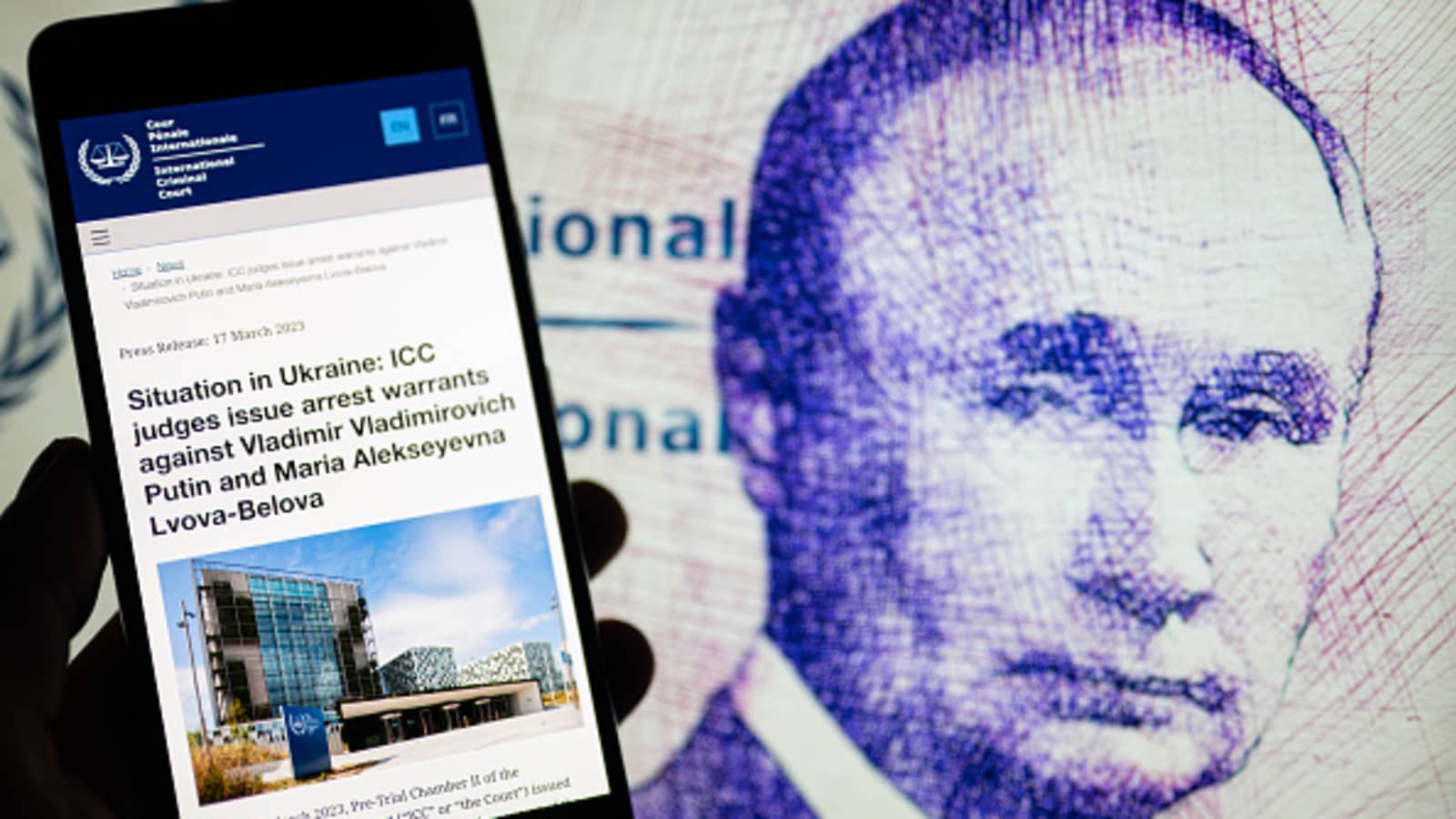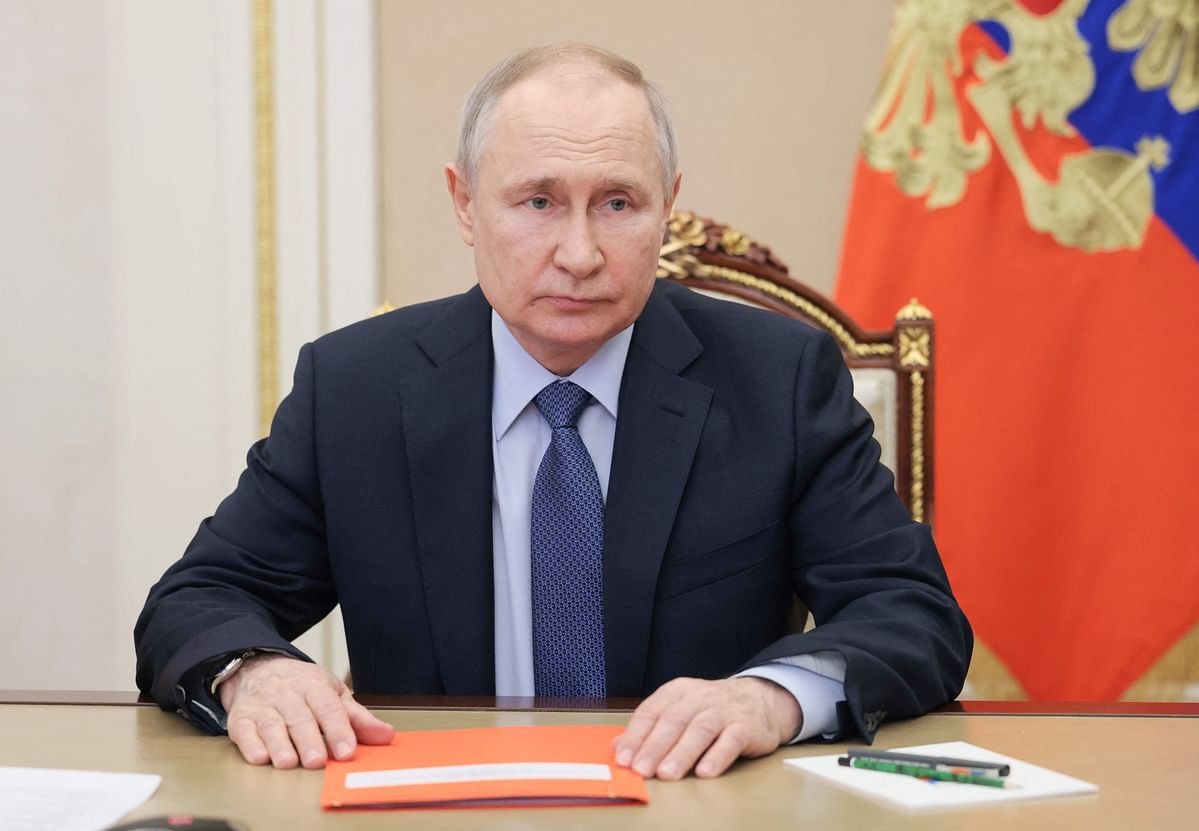Vladimir Putin And Maria Lvova-Belova Have Arrest Warrants Issued By The ICC For Crimes Against Children.
In the opinion of the court, Putin is personally liable for the abduction and deportation of Ukrainian children since Russia's all-out invasion started in February last year. In addition, the court issued a warrant for Maria Lvova-Belova, Russia's former commissioner for children's rights and the public face of a Kremlin-sponsored initiative that has seen Ukrainian children and teens deported to Russia.

ICC judges have issued arrest warrants for Vladimir Vladimirovich Putin and Maria Alekseyevna Lvova-Belova for the situation in Ukraine due to allegations that they transported and deported children from captured regions of Ukraine to the Russian Federation.
According to reports, the crimes in the occupied area began on February 24, 2022. Maria Lvova-Belova, Russia’s Commissioner to the ICC, released a press release that was uploaded to the internet together with Putin, and a warrant for her arrest was issued for child rights.
The warrants for the arrests have a purpose.
Putin and Belova are charged with violating Articles 8(2)(a)(vii) and 8(2)(b)(viii) of the Rome Statute. Unlawful removal and transfer of children to the Russian Federation from Ukraine’s territories under Russian occupation is a war crime. The latter describes the expulsion or relocation of inhabitants of the conquered region inside, whereas the former refers to the “unlawful expulsion or transfer or the forcible transfer of its civilian population into the captured area, often known as “confinement,” by an occupying army, whether directly or indirectly.
The ICC asserts that there are compelling grounds to suspect that Putin personally bears responsibility for the crimes, the offences listed in Rome Statute article 25(3)(a), and (ii) failing to exercise adequate supervision over subordinates in the military and civilian sectors under his effective control, thereby engaging in or approving actions that violate Rome Statute article 28(b).
In the opinion of the court, Putin is personally liable for the abduction and deportation of Ukrainian children since Russia’s all-out invasion started in February last year. In addition, the court issued a warrant for Maria Lvova-Belova, Russia’s former commissioner for children’s rights and the public face of a Kremlin-sponsored initiative that has seen Ukrainian children and teens deported to Russia.
“There are reasonable reasons to assume that each defendant bears responsibility for the war crime of population expulsion and the movement of people from the seized Ukrainian territory to the Russian Federation,” the court said in a statement. In October, it was discovered that numerous Ukrainian children had been abducted as part of Russia’s ongoing relocation program. The painful process of compulsion, trickery, and force was detailed by the kids. The shipments have been defended by Russia on humanitarian grounds.
Attorneys familiar with the ICC case recently stated that they anticipated prosecutors would move forward with the arrest warrants due to the substantial body of publicly available evidence. In a statement released, the court expressed its concern that “the activity addressed in the present scenario is reportedly ongoing and that public knowledge of the warrants may help to prevent the continued commission of crimes.
What exactly is the ICC?
The Rome Statute, a 1998 treaty, led to the creation of the International Criminal Court, whose main headquarters is in The Hague, the Netherlands. When required, it “investigates and brings proceedings against persons alleged to have committed the most serious offenses of genocide, war crimes, crimes against humanity, and aggression,” all matters of concern to the international community.
There are now 123 parties to the Rome Statute, including Germany, Afghanistan, the UK, and Japan. The States, on the other hand, have maintained their neutral stance, contending that the ICC shouldn’t have jurisdiction over citizens of countries that aren’t signatories. In a similar vein, China and India have also rejected joining.
Only when a nation’s government cooperates can the International Criminal Court investigate the most heinous crimes. Own judicial system failed to act, as was the situation in the former Yugoslavia and Rwanda. The International Criminal Court (ICC) deals with individuals, whereas the International Court of Justice (ICJ) deals with governments and inter-state conflicts. Nevertheless, the ICC’s authority is confined to crimes committed after its establishment on July 1, 2002.
Moreover, the offenses must be committed in a country that has ratified the agreement or by a person from a ratifying country. The ICC may also exercise its authority over instances presented to it by the UN Security Council.
Does the ICC have the ability to pursue Russia?
While Ukraine’s President Volodymyr Zelenskiy stated the measure would lead to “historic responsibility”, Kremlin spokesperson Dmitry Peskov remarked that Moscow thought this “outrageous and unacceptable” Putin also stated that any court ruling would be “null and invalid” because Russia is not a member of the ICC.
This, however, creates a situation in which Putin faces arrest every time he travels. According to The source, these steps, along with current Western sanctions, will further isolate him and limit his overseas excursions. Furthermore, if he travels to a state party to the ICC, that government is required by international law to arrest him. Furthermore, this is the first time the ICC has issued an arrest warrant against one of the UN Security Council’s five permanent members.
In November 2022, an ICC prosecutor attempted to press allegations of war crimes against Uganda insurgents and Lord’s Resistance Army founder Joseph Kony.
Does Ukraine acknowledge the ICC’s jurisdiction?
Although it is not a state party to the Rome Statute, Ukraine has twice exercised the ICC’s jurisdiction over alleged crimes under the Rome Statute that occurred on its territory under Article 12(3) of the Statute. This is according to the ICC’s official website. Article 12(3) states that if a state that is not a party to the legislation is required to acknowledge the court’s jurisdiction, the state may do so by notifying the Registrar and cooperating immediately and without exception.
The “Independent International Commission of Investigation on Ukraine,” an UN-mandated investigating agency, provided a full account of the alleged crimes, including the deportation of minors, in its findings. The panel described the amount of evidence and how it shows that Russian authorities broke “a wide spectrum of international human rights legislation and international humanitarian law in numerous parts of Ukraine and the Russian Federation” in its report dated March 16.
Several of these behaviors, according to the report, constitute war crimes and include kidnappings, forced transfers, assaults on civilians, wrongful detention, torture, and rape.
The investigation recorded the indiscriminate, disproportionate strikes and lack of preparations, thus breaking international humanitarian law, and said that the Russian military forces used explosives in operations in inhabited areas with “an obvious disdain for civilian loss and suffering” The tribunal also concluded that the waves of assaults by the Russian military on the energy infrastructure of Ukraine beginning in October 2022 and its use of torture may constitute crimes against humanity.
Further inquiry was also advised to hold the relevant parties fully accountable, taking into consideration both criminal liability and the victims’ legal rights to the truth, restitution, and prohibition against repetition. The study was a direct forerunner to the ICC warrants and was based on more than 500 interviews, satellite pictures, and trips to cemeteries and detention facilities.
What does the warrant imply for Putin?
The warrant was lauded by human rights organizations as an important step in ending impunity for Russian war crimes. In Ukraine; however, the likelihood of a trial taking place while Putin is still in office appears slim given that the court cannot try defendants in Russia has declared it will not hand over its officials.
The orders were swiftly rejected by Russia’s foreign ministry, which noted that it is not a party to the court. Putin’s international travel may be restricted by the arrest order, which only serves to further his isolation in the West. He must be detained if he enters a state that is a party to the ICC because that nation is required to do so by international law.
Putin becomes a pariah as a result, according to Stephen Rapp, a former ambassador-at-large who now directs the Office of Global Criminal Justice at the U.S. State Department. “He risks being arrested if he goes. This remains forever. And he said that if Russia didn’t follow the warrants, sanctions against it would remain in place.
Putin will either be put on trial in The Hague, according to Rapp, or he will become more and more isolated before passing away with this hanging over his head. The court must rely on other leaders and countries to serve as its sheriffs throughout the world since it lacks the authority to detain or bring to justice sitting heads of state. If a suspect can avoid being apprehended, the charges against him or she may never be heard in court.
The situation was compounded by a court action, though, in late 2017. In November, the court’s prosecutor petitioned to press on with the confirmation of charges of war crimes and crimes against humanity against Joseph Kony, the Ugandan militant and founder of the Lord’s Resistance Army, even though he is not in jail and has been a fugitive for years.
Kony, who turned abducted kids into soldiers, is accused of killing people, abusing them cruelly, using them as slaves, raping them, and attacking civilians. Khan’s motion is essentially a trial balloon to see whether the judge will concur that charges can be verified even if a person is not in custody.
Edited by Prakriti Arora





